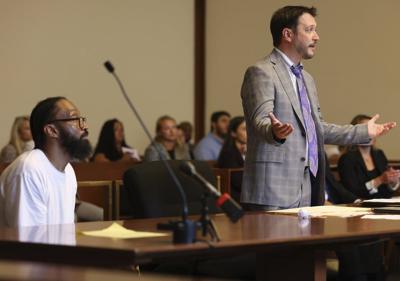BOSTON (AP) ÔÇö Defendants are being released in Massachusetts in the wake of a prolonged dispute over pay for the stateÔÇÖs public defenders, and one of those set free was charged with a serious crime.
The first four defendants without legal representation were freed Monday by a Boston judge following a ruling last week by the stateÔÇÖs highest court to implement a process that requires releasing defendants without attorneys after a week. Among them was a man accused of strangling his pregnant girlfriend.
Under the so-called Lavallee protocol, more are expected to be released in the coming days unless lawmakers address demands from public defenders for a moderate pay increase. The state agency representing public defenders had proposed a pay increase from $65 an hour to $73 an hour over the next two fiscal years for lawyers in district court, an increase from $85 an hour to $105 an hour for lawyers in Superior Court and $120 an hour to $150 an hour for lawyers handling murder cases.
But the 2026 fiscal year budget of $60.9 billion signed Friday by Democratic Gov. Maura Healey didn’t include any increase. Public defenders mostly in district courts have refused to take on new cases since May, arguing they are the lowest-paid public defenders in New England.
ÔÇťWhile the courtÔÇÖs decision last week to implement the Lavalle protocols is welcome news and a critical step in making sure that people are not held in custody without lawyers, it is far from a solution to the crisis the courts are in,ÔÇŁ said Shira Diner, a lecturer at the Boston University School of Law and the immediate past president of the Massachusetts Association of Criminal Defense Lawyers.
ÔÇťEvery day that our courts are without bar advocates is another day the criminal legal system isn’t running the way that itÔÇÖs supposed to,ÔÇŁ she said. ÔÇťWithout appropriately compensated lawyers in court, the system cannot function.”
Democratic legislative leaders would need to consider a supplemental budget in the coming weeks to accommodate a pay raise, but there was no immediate sign that a plan was in the works.
ÔÇťThe right to legal representation is a crucial element of the Constitutional guarantee to a fair trial,” a spokesman for the House said in an email statement. ÔÇťAt the same time, the House has a responsibility to Massachusetts taxpayers to ensure that we budget in a fiscally responsible manner, especially during this period of significant economic uncertainty.ÔÇŁ
Republicans were quick to pounce on the issue and suggest Healey, who is up for reelection next year, was to blame.
ÔÇťThis situation is spiraling into a full-blown constitutional crisis and Governor Healey is nowhere to be found,” said Paul Craney, the executive director of the Massachusetts Fiscal Alliance, which promotes fiscal responsibility, in a statement.
The Committee for Public Counsel Services, which oversees public defenders, petitioned the Supreme Judicial Court to allow the Lavalle protocol to take effect due to the work stoppage.
Along with releasing defendants after seven days, the protocol also requires that charges be dropped for a defedant lacking legal representation after 45 days. The judge ruled to enact the protocol on Thursday, though she declined to raise the pay rate for public defenders.
ÔÇťDespite good faith efforts by CPCS and the local bar advocate organization(s), there is an ongoing systemic violation of indigent criminal defendantsÔÇÖ constitutional rights to effective assistance of counsel due to CPCSÔÇÖs incapacity to provide such assistance through its staff attorneys or through bar advocates,” Associate Justice Dalila Argaez Wendlandt said in her order, noting as of June 29 that there were 1,144 defendants in the district courts of Middlesex and Suffolk counties without attorneys. More than 60 were in custody.
Massachusetts is just the latest state to struggle with ways to adequately fund its public defender system.
In Wisconsin, the signed into law last week by Democratic Gov. Tony Evers would increase the pay of public defenders and district attorneys in each of the next two years. That comes after the Legislature in 2023 to address rising caseloads, high turnover and low salaries.
Public defenders in Minnesota averted a walkout in 2022 that threatened to bring the court system to a standstill. A year later, the legislature came up with more funding for the so that it could meet what the American Bar Association recommends for manageable caseload standards.
with a critical shortage of court-provided attorneys for low-income defendants. As of Tuesday, nearly 3,500 defendants did not have a public defender, a dashboard from the Oregon Judicial Department showed. Of those, about 143 people were in custody, some for longer than seven days. In a bid to respond to the stateÔÇÖs public defense crisis, lawmakers last month approved over $2 million for defense attorneys to take more caseloads in the counties most impacted by the shortage and over $3 million for Oregon law schools to train and supervise law students to take on misdemeanor cases.
___
Associated Press reporters Claire Rush in Portland, Oregon, Steve Karnowski in Minneapolis and Scott Bauer in Madison, Wisconsin, contributed to this report.
























